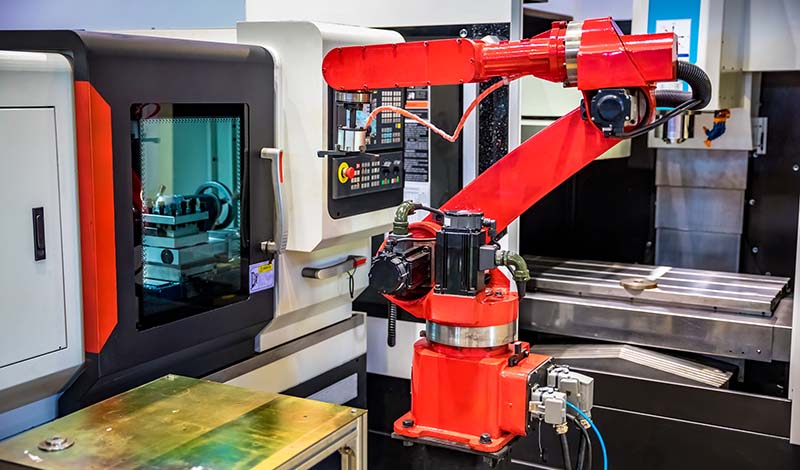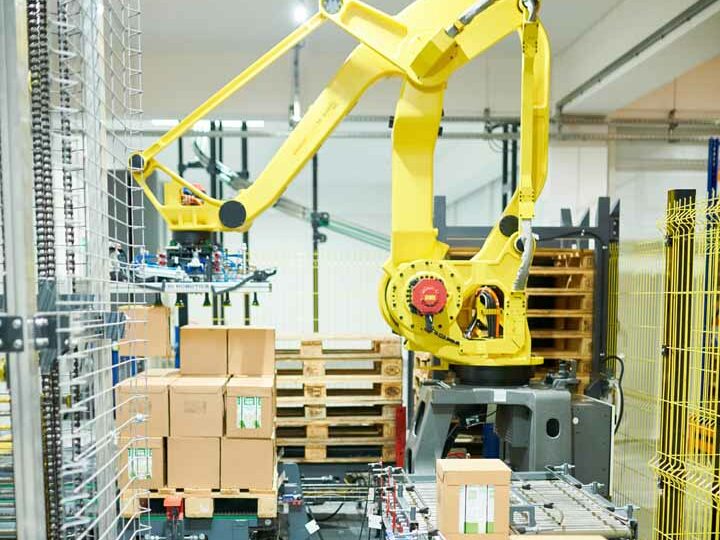
The future of robotic process automation (RPA) is both an exciting emerging technology and a must-have for businesses that want to up their efficiency and streamline business processes. It can combine technology already in use, such as artificial intelligence (AI) and machine learning (ML), to effortlessly automate the entire production line.
The future of RPA hangs on its ability to mimic human behavior while processing large amounts of data needed to perform tasks. This allows an “automation anywhere” approach to efficiency flow across industries and departments.
Robotic process automation (RPA) is robotic software designed to complete tasks according to specific parameters by mimicking human behavior when it comes to digital processes. This means that the RPA or bot software reads digital processes and can be programmed to perform those tasks. These bots are best suited to repetitive processes that can be labor-intensive or prone to human error.
RPA is intelligent automation that can be used to duplicate and carry out high-volume, repeatable tasks usually performed by humans. RPA software “bots” work by parsing data, making decisions, and executing processes on behalf of users. This not only helps businesses to automate complex processes quickly and accurately but also frees up employees to focus on more value-added tasks.
In addition, RPA bots are user-friendly and can be deployed without the need for extensive training. As a result, businesses can achieve quick ROI and start seeing productivity benefits almost immediately. Finally, RPA can also be used to improve customer experience by carrying out tasks such as data entry and reporting.
By automating these time-consuming and error-prone tasks, businesses can provide a better service to their customers. In conclusion, RPA offers a wide range of benefits for businesses of all sizes. Consequently, businesses that implement RPA can reap the rewards in terms of increased productivity, accuracy, and customer satisfaction.
Below, we will go into more detail about the benefits of RPA for businesses.
1
RPA allows for the completion of tasks that would take its human counterpart hours to complete — for instance, skimming through reports to create separate reporting for different divisions. These types of functions can be tedious and time-consuming — however, bots can complete these tasks much faster. It also frees the worker to perform other tasks, thereby boosting the productivity of that division.
2
Robotics allows the continuation of tasks for as long as needed, whether it’s for a few hours or round the clock. The human workforce doesn’t have that capacity, even when scheduled to work shifts. Fatigue, and especially repetition fatigue, can cause production to slow down. RPA can solve this and increase business efficiency.
3
When it’s time to increase business operations and automate your floor, we at PEC can offer a combination of RPA solutions. Our process includes RPA tools such as Blue Prism to ensure a rule-based setup that automates tasks according to your specs.
Expanding on RPA is simple enough as you can integrate robotics into your existing setup, and even tasks such as drag and drop can be set up in under an hour. You can choose to scale a portion of the business or the entire operation.
4
The effective management and use of resources in the business can improve the bottom line. There is a higher likelihood of wastage and errors when there is a human element. Robotics can take over tasks that require precision to avoid waste.
Also, when robotics are able to perform mundane and repetitive tasks, human resources can be deployed to other tasks instead. The inroads engineers are making toward better data processing will also result in a reduction of resources. The processing of unstructured data can mean a great deal in terms of resource allocation for businesses.
5
RPA streamlines communication between systems, allowing for simplified data transfers. This encourages different teams to gather data faster to ensure effortless transfers between the various departments. It plays a large part in managing client expectations and creates accurate estimations of turnaround times.
6
There are innumerable safety hazards on a production floor that range from moving equipment to cabling and exposure to hot instruments. RPA has safety benefits such as:
7
RPA relies on RPA software to perform the tasks required by the business. The software also allows the effortless sharing of data between the RPA platforms, which ensures that each element of the production line knows the tasks set before it. There is little room for error, and with the addition of process controls and automated processes, mechanical failure is easily identified and resolved. For businesses, this means a reduction in downtime.
8
Robotic process automation tools allow software configurations that identify potential hazards, breakdowns in communication, and issues in the production flow through triggers. RPA tools can also be configured to perform self-diagnosis and, where possible, self-maintenance. When this isn’t possible, it can alert teams when it’s time for servicing, maintenance, or repairs.
9
Software advancements make it easier to have a plug-and-play approach to RPA. RPA software and tools are designed to work with existing machinery and equipment software and combine reporting tools to ensure a quick setup and effortless implementation of your business’s digital transformation.
10
RPA creates inroads into a digital workforce that doesn’t have to be on the floor to manage it, especially where there are concerns for safety. Workers can perform their functions safely through remote technology.
From a production perspective, this means round-the-clock availability, as robots don’t require rest. It also means teams can easily be divided into remote monitoring shifts, which requires fewer hands on deck.
Even the administration and analytics side can be automated as bots can be programmed to extract, process, and report relevant information. With a digital workforce, it’s easier to keep track of information and have a more accurate and accessible audit trail.

RPA aims to be an extension of current business operations with the task of improving efficiency, safety, and productivity. RPA doesn’t just work in isolation. It’s often combined with automation tools and can also integrate other facets of machinery and robotics used in businesses.
This non-disruptive approach to business automation means the effortless combination of artificial intelligence, machine learning, and robotics automation to create that proverbial well-oiled machine.
But RPA takes this one step further and incorporates natural language processing (NLP) techniques to make sense of unstructured data. Unstructured data can be a major hurdle for businesses looking to automate their processes, as previously, RPA simply couldn’t read certain data applications. This includes files such as scans, audio and video files, and even images.
This combination of AI, ML, and NLP allows RPA to scale automation into areas we’ve never explored before, and PEC is keeping a close eye on these developments as they unfold. These advances in automated robotics can make substantial strides in the efficacy of business automation protocols. That endless stream of effortless data management is what businesses strive for to focus their human resources on tasks that are safer and less mundane.
While there are countless benefits to the implementation of RPA in your business, it can only benefit your production flow if the installation, monitoring, and maintenance are done by experienced professionals. The dangers of entrusting the installation to anyone but a professional can result in:
1
When a system is automated, especially robotic components, it’s important that the human element is considered. Where there are people who work alongside these robots, it’s imperative that the safety standards are high and closely attuned to have a safety-first approach.
2
RPA relies on software and tools for maximum efficiency. When these aren’t aligned or programmed to suit the business’s needs, it can result in damaged goods, wastage of resources, and misalignment of production goals that can cost the business money.
3
It’s also possible to propose a solution that’s superfluous to the business’s needs and can cost the business unnecessary expenses. RPA implementation can be costly, but the right solution easily absorbs those costs in increased productivity and efficiency. The opposite can be said for incorrect implementation.
4
The benefits of RPA strongly rely on the quality of the installation. This means that quality goods are used in the process and that the highest level of care is taken when deciding on software and tools. While you might spend less on aftermarket equipment, it may not ensure longevity and accuracy. Good quality materials, software, and tools are also important for safety reasons.
Figuring out where to start the RPA process can be daunting. The right team of professionals can help guide you through the process, regardless of the size of your business. If you have any processes that require robotic automation, there is a potential process solution.
RPA development and implementation is an exciting pursuit for PEC. Our team of experts provides a comprehensive suite of RPA services to meet your RPA goals. Our services include consulting, assessment, implementation, and support. Schedule a consultation to learn more about our RPA solutions.